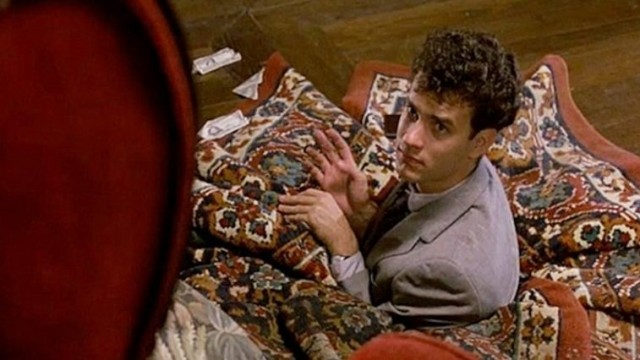Producer and writer David Giler has a fascinating career in Hollywood. After writing a handful of television episodes, he broke onto the big screen as a writer of Myra Breckinridge, the psychotic X-rated adaptation of Gore Vidal’s savage social satire (starring Raquel Welch). Noted for its extreme use of camp and incoherence, Myra Breckinridge is the type of travesty that would shut down careers of lesser men. Giler would go on to write The Parallax View and co-found Brandywine Productions (responsible for the Alien series. He also received screenplay credits on Alien 3, Fun with Dick and Jane, and today’s feature: The Money Pit.
In 1986, Tom Hanks was in the middle of his run of comedies as a put-upon schmo. He was targeted as the wrong man in The Man With One Red Shoe, he was put upon in The ‘Burbs and Joe Vs. The Volcano, and, here, he’s a put upon home owner. Hanks’ Walter Fielding, Jr. is broke and watching his father’s accountant agency start to fail after his father skimmed money from their clients and high tailed it to Tahiti. When Walter and his girlfriend, Anna, are kicked out of the Manhattan apartment they’re housesitting for Anna’s ex-husband, they have to immediately find new housing and stumble on a dirt cheap mansion that falls apart the moment the papers are signed, forming the foundation for a litany of visual sight gags and slapstick setups.
Giler was no stranger to political metaphors in movies, and The Money Pit is a key comedy that reconciles 1970s cynicism with 1980s faux optimism. In no small way, the decrepit mansion at the heart of The Money Pit is a stand-in for the American Dream sold to the next generation by a bunch of old shysters. The sellers of the mansion are a couple of older con artists who go around the country selling shitty dreams to gullible people (they later sell a mansion to Hanks’ con–artist father). But, the American Dream is in disrepair and there are any number of opportunistic business men looking to capitalize on other people’s suffering. It’s the 1980s-era requisite happy ending that tries to convince the audience that the Dream is reparable with an unlimited supply of money, loans from richer people, and the hard work of misfits and illegal immigrants (the initial team of plumbers are a bizarrely 80s group of BDSM-leather adorned body builders, bikers, overly pierced punk types and even a little person). From a modern standpoint, its difficult not to see The Money Pit as a “yeah, life may be shitty now, but we can fix it to be better for everybody), even as the inequality gap was steadily growing.
Directed by Richard Benjamin, The Money Pit is all about the visual gag, though it has a rudimentary “fuck you, pay me” visual style. Benjamin had a tendency to over-light his films whenever possible, creating a visually flat image. Not even the presence of Gordon Willis could save this from the 80s sitcomification of cinema. Yet, as the mansion steadily falls apart, and Hanks’ sanity dissipates with every physical act, the slapstick stays impeccably timed and hilarious. The Money Pit isn’t an underrated classic, but it has far more going under its hood than one might have imagined.
The Money Pit streams on Netflix.
(alternate films streaming on Netflix: We’ve mentioned these films before, but they’re about to leave Netflix on June 1, so this is a last chance for now: Madonna: Truth or Dare and Paris is Burning are set to expire just in time for Pride Month)

